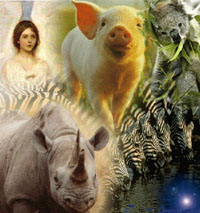NPPC
THE PRICE OF PORK
"As often as Herman had witnessed the slaughter of animals and fish, he always
had the same thought: in their behaviour toward creatures, all men were Nazis"
Isaac Bashevis Singer

Putting both sides of the picture?
National Pork Producers Council
"Food Fun for Kids"
E-mail the NPPC
snydercw@nppc.org
NPPC : ANIMAL ABUSERS OR EDUCATORS?
Imagine for a moment what it feels like to hung up and unable to move because one's body has been paralysed by a severe electric shock. Imagine next what it feels like to be butchered by having one's throat cut - while one is still fully conscious. In what circumstances is inflicting pain of this nature ethically justified?
Pigs are gentle, sensitive and intelligent. They are naturally inquisitive and social animals. Originally, they lived in woodlands. Here they would forage for roots, nuts and seeds.
Their lives today in factory farms could scarcely be more different. Inside indoor facilities, the distressed animals are likely to be stacked two and three decks high. Except for feeding time, they are often kept in total darkness. Each pig endures solitary imprisonment in a "bin". A bin is a cage just a little larger than the animal's body. Pig tails are routinely amputated. Pigs who live through their stress and fright
will adopt coping behaviors. These involve pacing, repetitive rocking, and incessant
biting of, or banging on, the bars. The NPPC blames the animals; it calls
these behaviors "vices".
Sow stalls are metal-barred pens so narrow the
sow is unable to turn around. In tether stalls, the sow is tethered by a heavy chain attached to a strap around its neck or body. Floors are concrete or slatted. There is no bedding. After rearing 4-7 litters of piglets, the three or four year-old sows are exhausted. They are slaughtered to make low-grade sausages and pork pies for human consumption.
One method used to crank up pork production is to take piglets away from
their mothers soon after birth. The forced weaning allows the sow to end her
lactating period so she can become pregnant again. To prevent piglet death
due to the emotional loss, a mechanical teat may serve as a substitute. The mother's emotional loss has no economic value. It is therefore ignored.
What does it feel like to be treated in this way? It's probably beyond our imagination. Pigs have a profound capacity to suffer pain and stress. If each of us knew the horrific story of suffering and terror which lay behind our last meal, we might find the gruesome deaths of our victims harder to stomach.
For one has to ask: Does the fact we like the flesh of other creatures morally outweigh the cruelty we inflict on other sentient beings in its production? Are non-humans just commodities - disposable objects we may treat any way we see fit? Just how much suffering are we ethically entitled to inflict on others to please our taste-buds? Or to make money?
The transport of pigs for slaughter can involve up to three days without their having food, water, or rest. The trauma typically results in conspicuous weight loss and other signs of deprivation. The slaughtering process itself causes intense fear and pain to the distressed pigs. They are transported on a conveyor-belt or goaded up a ramp in the stench of their fellows' blood. "Ideally" (sic), the animals are rendered unconscious by a captive-bolt gun or electric shock before their throats are slit. Many of our victims are not so fortunate.
The National Pork Producers Council can be e-mailed at
snydercw@nppc.org
NPPC
Slaughterhouse
The Slaughter of Animals for Food
ALF FAQ
Pig Links
A Happy Pig
Animal Rights FAQ
The Taste of Depravity
The Post-Darwinian Transition

HedWeb
HerbWeb
BLTC Research
David Pearce's Home Page
E-mail Dave
dave@hedweb.com



